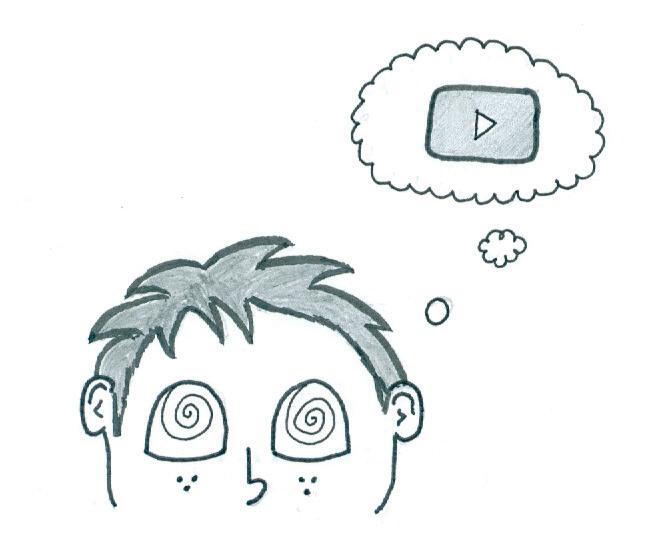
8 minute read
YouTubers
Students deserve voting rights
CVUSD students are underestimated. At the school board meetings, community members and board representatives claim to be working for the best interests of the kids. Yet it is these same kids who have been publicly shamed and ridiculed when voicing their opinions at board meetings and who have been personally ostracized by trustees. Each meeting I am met with a member of the board or of the community claiming to know exactly what the majority of students are feeling, while I, an actual student, sit silenced in the audience. Th e irony is bitter.
Advertisement
Last spring, during the time that the ethics of the opt-out policy were under discussion, students packed the tiny boardroom waiting hours for their two minutes at the podium. Kids voiced their opinions on the impending education policy, on student rights in the making of district policy, and on the vote 16 initiative. Interestingly enough none of their views aligned with what members of the board claimed was the “best thing” for students. Many of them were interrupted by the ding of the timer and scoff ed off the stage. Maya Chari Photographer
I will not be able to vote in the November election, nor will the majority of my peers. I have personally spent the past year attending nearly every board meeting, following the evolution of policy diligently, reporting (with much board and community resistance), on the opt out controversy from all angles. I have been individually labeled by trustee Sandee Everett, in an email response to an interview request, as “a reporter (who) has shown that they do not check facts”, as “trust must be earned in the journalism world.” When I asked Mike Dunn, former board president, the question “As a member of the school board, do you believe that it is your prerogative to use religion as basis for your decisions?” he wrote back that he “would not deny (his) faith in Jesus Christ to appease the secular humanists who hate (his) Christian religion,” proceeding to compare secular humanism with “Hitler and Goebbels”, and ending his email by suggesting that I read the Secular Humanist manifesto. And yet, I am considered too young, and too immature to vote for future board candidates.
CVUSD students are passionate.
You shouldn’t want to
Contrary to the belief that some may hold, we are capable of making rational decisions when it comes to the integrity of our education. We are the group most impacted by many board decisions, and yet our voices are blatantly silenced. By the time we are able to vote for district candidates we are already out of high school, oft en on our way to college, and no longer possess the same proximal connectivity to district issues.
CVUSD should implement a vote 16 policy, so that board members no longer have to assume the feelings of their constituents. I know, from experience, that there are hundreds of perfectly valid opinions that are being ignored under the guise of lack of experience and appreciation for responsibility. But this is the age where kids are most impacted; this is the age where kids should be urged to vote and stand up for what they believe in rather than be told to sit back and let the adults fi gure it out. It’s all fi ne and good to let parents parent, but it is the responsibility of the district to also let students speak.
Emily Augustine/ Prowler
be a YouTuber
Manas Khatore Staff Writer
When asking a child what they want to be when they grow up, the expected answers include fi refi ghters, nurses and actors. However, in 2018, when asked the same question, many kids reply with this: “I want to be a YouTuber.”
YouTubers make a living posting videos onto YouTube, and they possess massive infl uence and fame in today’s culture. As a result, according to Infl uencer Marketing Hub, their annual incomes oft en rank in the millions.
As reported by Th e Sun Magazine, over 50 percent of students surveyed listed “YouTuber” as their top career choice. Even though the life of a YouTuber seems appealing, the road to becoming successful on the platform isn’t worth the rewards. Because of this, the infl uence that YouTubers have on students ends up doing more harm than good.
First of all, YouTubers don’t go far in their educational pursuits. Since most YouTubers are in their early twenties, many do not attend college or other forms of higher education. In fact, several YouTubers decide to drop out of traditional high school in order to focus on their newfound careers.
Since these YouTubers are immensely successful, students who watch may develop the notion that dropping out of school or not going to college can lead to great success. However, this is a classic case of “survival bias,” meaning that only those who are successful with their choices can advocate for why they chose right. We hear success stories from large YouTubers who didn’t pursue an education, but we don’t hear the many more people who are struggling in the real world with limited schooling.
YouTube has changed drastically from what it started as 13 years ago. In 2005, there were very few creators on the website, making it easy to gather an audience and gain fame. Today, however, fi nding a specifi c niche in the YouTube community is next to impossible, as videos have been made on almost every subject imaginable. Consequently, attracting a substantial and loyal audience is very hard, and for many YouTubers, it never happens. So it begs the question: how do creators actually become successful?
By looking at the content of many top YouTubers, it becomes clear that they off er very little in quality to their viewers. Successful videos oft en rely on shock factor to gain views, degrading the value of the videos themselves.
Logan Paul uploaded a video titled “We Found a Dead Body in Japan” on Dec. 31, 2017 in which he and his friends traveled to the famous Aokigahara, or “suicide,” forest. When Paul found a corpse hanging from a tree, he decided to fi lm his reaction to it, consisting of laughing and making jokes. His behavior clearly mocked the topic of suicide, but the video gained millions of views and was at the top of the trending page.
More than anything, this video conveyed that success on the platform translates to posting controversial content that stirs drama within the community. Students who aspire to be YouTubers will pick up on this trend, leading them to post videos that intentionally spread negative ideas. Eventually, the students who upload such videos will start to believe the themes that they spread.
Th ere are many YouTubers that use their platform to spread constructive messages to their viewers. However, this positive content doesn’t bring the same money, audience or publicity. As seen in the case of Logan Paul, these videos aren’t promoted nearly as much as those who do the opposite. Clearly, the path to becoming successful on the platform isn’t worth the rewards it may provide.
Beware of bamboozlement!

Daria Azizad Entertainment Editor


When people talk about getting played, they are usually referring to a former signifi cant other or Internet scammers from Nigeria. But there’s another equally horrendous player out there: college counseling services.
College counseling services prey on vulnerable students hoping to achieve admittance to their dream school.
“College acceptance rates drop every year,” says one of my peers. “UC schools discriminate against California students,” says another. “It’s really just a game of chance,” says a Newbury Park alumni.
Th at’s where the college counselors come in: they promise an easy ride through the application process, support whenever you need it, and of course, a nice envelope with a college acceptance letter tucked inside by Springtime. Sounds too good to be true, right? I was determined to fi nd out.
I decided to look for a college counselor myself. With a quick Google search, I was bombarded by testimonial aft er testimonial raving about how Counselor No. 1 had 30 years of experience with admissions, or about how Counselor No. 2 attended 3 diff erent Ivy Leagues and served on admissions boards for each. Overwhelming much? Th e list went on and on. Not knowing where to start, I clicked on one that sounded reasonable and gave them my contact information.
I nervously awaited their call-- no, not just because I hate talking on the phone-- hoping that they would soon tell me they had, in fact, fi gured out the perfect algorithm to get me into college.
A few days later, the call came. Aft er introductions and a rundown of the counselor’s experience, he began explaining what the counseling process would be like: “We try to make you unique, diff erent and perfectly positioned for what they want. We tell you what to write your essays about and then edit them to perfection.”
So far so good-- although I was irked by lack of authenticity.
“...For only $15,000!” he fi nished. I put the phone on mute while I reattached my dropped jaw. 15,000 dollars?! No thank you.
“Uhhh, I think I’ll have to get back to you,” I replied and hung up the phone.
Well, I was not even through the fi rst page of search results -- there must be something out there more reasonably priced, I thought. As I researched, the prices grew steeper. A $40,000 here and a $20,000 there.
Maybe I am just looking at this from the wrong angle, I thought. I changed my search to “College application help” and dozens of pages of guidance and support popped up -- for free-- with the same information the pricey counselors boasted about.
It’s easy to be sucked in by the lure of someone who promises just what you want to hear-- especially when it feels like your future depends on it. College counselors make their living by preying upon the application process, off ering some essay edits and supposed “insider information” which is easily available online. An English teacher could provide the same essay help just as well. Someone that has the best-interest of the student in mind should not be exercising in the practice of exploitation.
Seniors, try to remember to avoid the trifecta of players out there.





